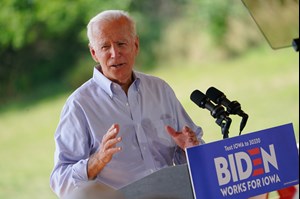Biden proposes mandates to cut methane leaks on federal land
(Bloomberg) — The Biden administration moved Monday to stifle methane releases from oil and gas wells on public land after a federal court tossed out earlier requirements.
A proposed rule, advanced by the Interior Department’s Bureau of Land Management, is aimed at throttling greenhouse gas releases from the sites, whether leaked from equipment, deliberately vented into the atmosphere or burned off. It is the culmination of an eight-year regulatory push to tackle methane releases from the oil industry, newly emboldened by provisions in the Inflation Reduction Act.
Biden administration officials cast the proposal as a fiscally and environmentally sound approach to conserving natural gas that is extracted from federal land managed by the Interior Department -- and therefore owned by US taxpayers.
“This draft rule is a common sense, environmentally responsible solution as we address the damage that wasted natural gas causes,” Tracy Stone-Manning, director of the Bureau of Land Management, said in a news release. “It puts the American taxpayer first and ensures producers pay appropriate royalties.”
The requirements only apply to a subset of US oil and gas facilities -- those on federal and tribal lands managed by the Bureau of Land Management, where there are currently about 100,000 actively producing wells. About one-tenth of US oil and natural gas production comes from federal and tribal lands.
The rule would require companies to spend an estimated $121.9 million annually to upgrade equipment at the sites, establish programs for detecting and repairing leaks and take other steps, such as proving there are sufficient pipelines to carry away natural gas from wells. The Bureau of Land Management also could delay action on drilling permits where it deems those waste-minimization plans are inadequate or incomplete “to avoid situations where oil well development outpaces the capacity of the available gas capture infrastructure.”
The measure also would impose new time and volume limits on the amount of methane that can be vented or flared without being subject to royalties -- a recognition that the activity can’t always be prevented, such as during emergencies or initial production tests.
According to the government’s analysis, the rule would lead to the conservation of some 15.3 billion cubic feet of gas annually and generate nearly $39 million per year in additional royalties from the sale of natural gas that would otherwise be forfeit.
Methane, the primary component of natural gas, is estimated to be at least 80 times more powerful than carbon dioxide at warming the atmosphere during the first two decades after it is released. When burned, it is transformed into carbon dioxide.
The proposal was cheered by environmentalists who say throttling methane emissions is critical to constraining global warming and keeping temperature rise below 1.5 degree Celsius, a critical tipping point.
“We need standards that end the waste of taxpayer-owned energy resources that has become far too routine on federal and tribal lands across the US,” said Jon Goldstein, senior director of regulatory and legislative affairs of Environmental Defense Fund.
A similar rule imposed under former President Barack Obama was tossed out by a federal court after the oil and gas industry successfully argued the requirements exceeded the agency’s legal authority by addressing air pollution.
The Western Energy Alliance, which successfully challenged the earlier mandates in federal court, said the new proposal still goes too far.
“It appears that BLM is making the same mistake again,” said Kathleen Sgamma, president of the alliance, which represents oil producers in the western US. “BLM has the authority to regulate what’s waste gas and charge royalties on it -- but not to impose air quality controls.”
Supporters maintain the latest proposal is built on a more solid legal foundation — specifically, provisions in the Inflation Reduction Act enacted earlier this year that require companies to pay royalties on all gas that is extracted from federal lands, even when it is released into the atmosphere or goes up in smoke.



